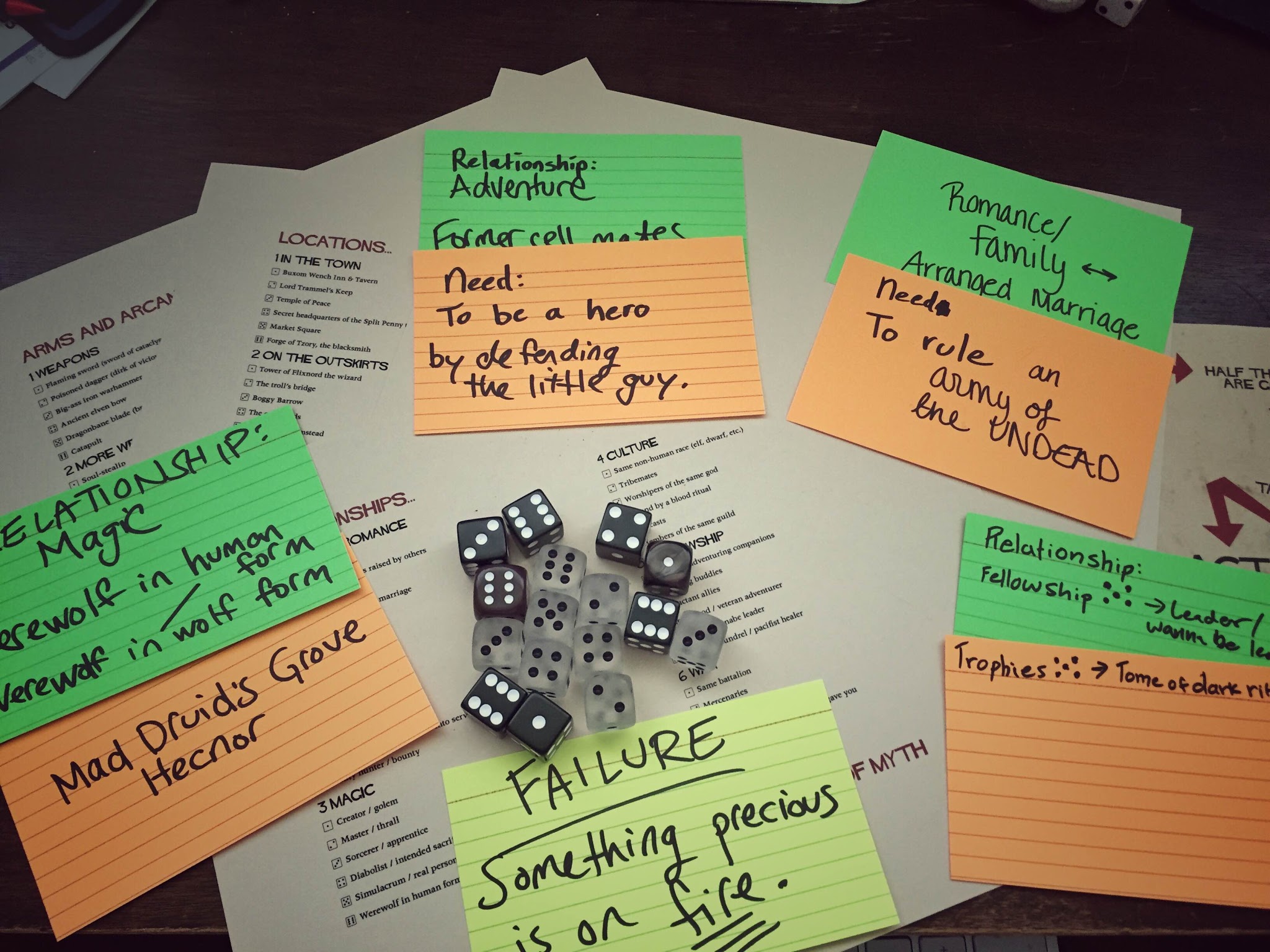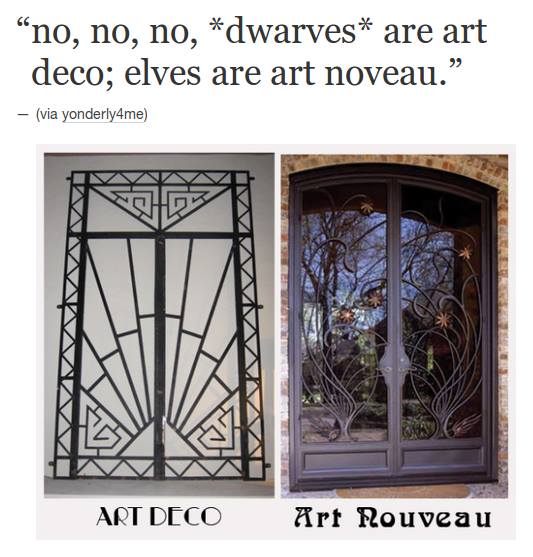Game Chef has BEGUN!
Here are the ingredients and the theme for 2016.
Who’s participating this year?
Originally shared by Cheyenne Grimes
GAME CHEF 2016
Game Chef is an annual analog game design competition. First held in 2002, it’s led to the creation of hundreds of envelope-pushing first drafts and a number of finished games that are now well-known in the story gaming community. Game Chef gives participants 1 theme, 4 ingredients, and 9 days in which to create an analog / tabletop game.
The competition runs simultaneously in six languages this year. Entries are peer reviewed, with finalists submitted to the global coordinators. A winner is chosen in each language, with one emerging as the year’s world champion.
Game Chef is for you, regardless of whether you’ve ever thought of yourself as a game designer. We aim to make the competition as accessible and welcoming as possible.
The Basics
Design and submit a playable draft of an analog (non-video) game between June 4th and 12th, inspired by the theme and ingredients listed below. Historically most Game Chef games have been tabletop roleplaying games or live action games, but innovative designers like you are constantly breaking down and re-envisioning the divisions between different types of games (board games, card games, roleplaying games, live action games, etc.) Feel free to push the boundaries of what counts as a roleplaying game, an analog game, or a game.
Each participant will review four games that others submit, and this peer-review process will determine finalists. A winner for each language that Game Chef runs in will be declared, though the real victory is completing a game in the first place.
This year, Game Chef runs simultaneously in the following language communities: Brazilian Portuguese, English, French, Italian, Polish, and Spanish.
2016 Theme
This year’s theme is: Technology
Pervasive and transformative, technology has always played a role in the evolution and transformation of humanity, ranging from the beneficial to the catastrophic. For this year’s game chef, we invite you to explore, question and discuss the impact of technology on games and on human society. How can you represent technological change in a game? What about the social and anthropological repercussions? What present has technology led us to, and what future is it building?
We also invite you to explore the role of current and future technologies in game design: how can they complement, expand and transform analog gaming? How can new tools enrich classic game practices, and what entirely new doors do they open? When a smartphone is as common as a six-sided die, and gamers meet over videochat and apps as often as they meet over maps and miniatures, what makes a game analog? Your game may use whatever props or technology you deem necessary. However, we don’t require reviewers or judges to actually playtest the games in order to judge them. They can judge your work on its creativity and playability alone. If your game requires a piece of technology, the more common that technology is, the more likely reviewers are to actually playtest your game
Game Chef has a storied legacy of fostering forward-looking, innovative game design. This year, we invite you once again to push boundaries, blaze new trails, and show us the technological future of analog gaming.
2016 Ingredients
This year’s four ingredients are: alarm, dance, sketch, and sunlight.
Incorporate 2-3 of the ingredients into your design. Try to incorporate the ingredients as centrally as you can, as part of the premise or the rules or however else makes sense to you. A passing reference is okay if that’s all you can come up with, but we suggest really drawing strongly on the ingredients. Like the theme, you’re free to interpret these ingredients in whatever way you want.
For example, the 2004 ingredients were ice, island, dawn, assault, which ended up inspiring games like The Mountain Witch (climbing icy Mount Fuji to assault the witch’s fortress), The Dance and the Dawn (try to find your true love at an island social gathering, hoping that — when dawn breaks — you don’t end up with the one that has a heart of ice), and Polaris (arctic elves struggle against themselves and a demonic assault, with the dawn finally coming for the first time in hundreds of years).
Game Format
There are a few guidelines for game format. Each guideline exists to make sure your game is accessible (especially to the peers who get randomly selected to review your game).
Strive to make your game formatting as accessible as possible. Make an effort to ensure that your game is accessible to those who are blind (and using a screen-reading device), deaf, or color-blind. The easiest (but not the only) way to ensure that your entry is accessible is to submit it in one of the following formats: a plain text file, a tagged PDF, a Google Drive file (or hyperlinked set of files), or an RTF (Rich-Text Format) document. Avoid using cluttered backgrounds or anything low-contrast. If you want to submit your game as a video file, you should also provide captions and a transcript. If you want to submit your game as an audio file, provide a transcript. Doing extravagant things with your submission is fine, but the responsibility lies with you to make sure that it remains accessible to readers.
Submissions should be under 4,000 words. If you create extras for your game, like playbooks, quickstart sheets, or other handouts, these extras count toward the word limit. Participants MAY choose to create extras that push their word count above 4,000, but judges and peer reviewers are not required to read any materials beyond the 4,000 word limit. There is no minimum number of words for games, as long as the text is long enough to be comprehensible.
Your submission doesn’t need to be a single file, but it does need to be a single link. In order to make sure your game is easy to share with reviewers, we require that you provide us with a single link for your entire game. This can be a download link to a zipped folder, a Google document that links out to additional materials, a YouTube video link, or something else–as long as you provide reviewers a single link to your game, it counts. Make sure that access to your submission does not require proprietary softwar
Rule on Previous Work
You may draw on concepts you have thought about or worked on before the contest, but everything you submit must be new work, not existing material. Plagiarism or self-plagiarism will disqualify your game.
Rule on Intellectual Property
It is ultimately the designer’s responsibility to deal with all rights-related issues. Including excerpts from public domain or open source content is fine, as long as you cite them. Drawing inspiration from other games is also fine, but give credit and put it in your own words.
Game Submission
Games are due before midnight UTC-10 on June 12th. To submit, complete the submission form provided by your language coordinator. Your game materials can be presented in any easily-accessed format, provided it’s contained within a single link (e.g., a Google Doc index, a zipped download folder, an online presentation, a website).
In order to do this, you may need to upload your files somewhere (options include: Dropbox, a WordPress media library, or other solutions). Contact an organizer if you need help doing this.
You may submit as part of a team. You may only submit one game total to one of the participant language competitions.
Initial Reviewing
Once games are submitted, each participant will be assigned 4 games to review. We will announce the deadline for you to pick one of the four to recommend for the next round. Your recommendation can be based on whatever criterion you determine to be most important. You may want to consider what each game accomplishes in terms of innovation, clarity, ingredient usage, and current playability. You don’t need to explain or defend your decision – just pick and recommend one of the four games.
As part of reviewing each game, we ask that you write a short critique/appraisal and send it to the game’s author. As Game Chef is a short competition that will inevitably create half-finished products, you don’t need to focus on fine details of language. Instead, share what you liked, what you were confused about, any ideas that you have for improvement or development, and any decisions you hope the designer will rethink. You can either email the designer your feedback or post it to their design thread if they started somewhere you can see. Aim to be helpful and encouraging.
Picking Winners
The games that receive the most nominations will be reviewed by the Community Coordinators for their language. One game from each language will be declared a winner for its language, and an international finalists. The international finalists will be translated into a common tongue and judged by an international cabal. One game from amongst these finalists will be crowned Game Chef Grand Champion. Additional awards and achievements may be awarded at the discretion of the shadowy ranks of past Game Chef Champions.
Winning Game Chef is a funny business. It’s a great honor, but the real focus of the competition is in stirring a great number of people into creative endeavor. We choose a winner in order to create that extra edge and push competitors to do their best work, while acknowledging that the real victory is getting a community to come together and make new stuff.


